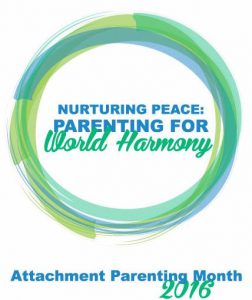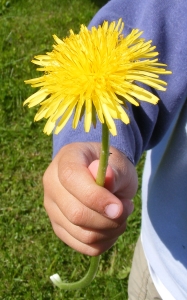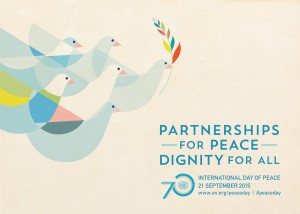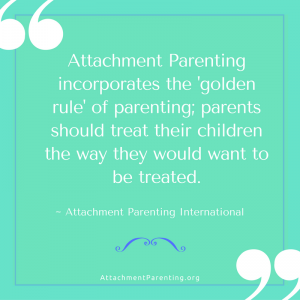Tag: Peace
Cultivating a peaceful family: 5 effective ways to tend to one’s inner harmony
 There’s that saying you’ve probably heard — “If Mama ain’t happy, ain’t nobody happy.” I first saw it, framed, in the kitchen of my high school friend and it made me slightly afraid of her mom. It seemed like it had been hung there as a warning.
There’s that saying you’ve probably heard — “If Mama ain’t happy, ain’t nobody happy.” I first saw it, framed, in the kitchen of my high school friend and it made me slightly afraid of her mom. It seemed like it had been hung there as a warning.
But parents, let’s be honest: We wake up a little sleep deprived from a late-night session catching up on a project, and the tension during breakfast is going to be thick.
On such mornings, I recognize this possibility looming in our kitchen when I notice how my daughter is looking at me. Just the other day, I caught that look and said with spatula in hand, “OK, yeah, I admit that I am too tired to be reliably nice this morning. Sorry in advance.”
“Breathe, Mama,” she reminds me, “I won’t fight today when you braid my hair.”
Here’s the thing: Our children are keenly tuned in to us. They know very well how to read the signs that serve as the early warning system indicating the likelihood of an impending mom-meltdown. Over time, they have become skilled at rating the level of threat like rangers adjusting those Smokey the Bear fire danger signs in the national forests: “Today’s Mom-fire threat level is Green.” (Whew, we’re OK.)
Your Brain on Stress
Researchers in the field of neuroscience are making exciting discoveries these days about the ways the body and mind are intimately connected. This gives us more insight into how it is that what we think and what thoughts we rehearse over and over actually change our brains. As our biochemistry is so changed, this has the power to affect the expression of our genes.
These findings also give us insight to why it is that when stress starts generating pressure and heat inside of us, our best intentions get vaporized.
The physiological responses that kept our ancestors safe do not help us in modern situations when we are not required to jump out of the way of a charging animal. What we perceive today as the danger that switches on our stress response is much different. Nonetheless, the nervous system still responds by shutting off the thinking and planning part of the brain — the prefrontal cortex — in order to send blood to the body so we can fight or run away.
But that is not a helpful response when it’s getting late in the morning and someone whines about losing their shoe or the garbage truck is blocking the driveway. While it might sharpen our reflexes so that we can deftly speed through traffic to get the kids to school, it is likely why the road rage happens since the part of our brains that inhibit undignified behavior is offline. (“Mom, you said a bad word to that guy!”)
Stress makes it more likely we will yell at our kids in spite of our best intentions to be the Zen-Mommy who guides her children serenely through the morning routine as if her mind is naturally infused with calming lavender essential oil. No parent wants to be the source of stress or bad times in the family, no matter how much responsibility, worry, or fatigue we are grappling with. But the truth is: When we get triggered, it affects our children. When that happens, we feel regret and add a black mark to our list of our failures.
What if there is a way to naturally achieve resilience to stress and to be easily able to access our inner resources? The good news is, it is not that hard to achieve the Sugar Land Integrated Counseling and Wellness teaches you how to take steps to give your inner life the attention required. Your family life will improve in delicious ways if you do.
We show up to the parenting journey carrying the baggage of our own histories: the fears, traumas, limiting beliefs, self-doubt, and those less-than-elegant, knee-jerk reaction tendencies. When the time comes to settle down, we unpack all that and then go about our business of creating a family.
If physical clutter in the home produces stress, how about all the emotional clutter of past regrets, hurts, sorrows, and traumas that we stuffed into the overfilled drawers of our minds? Imagine what a relief it would be to have the inner spaciousness that would allow us to breathe before we speak, or to listen mindfully so we can perceive the heart of the matter instead of reacting to what triggers us.
Fortunately, there are now several highly effective self-help techniques that are great tools to eliminate the internal clutter and create more emotional freedom and space, including these 5 effective ways to tend to one’s inner harmony for a happier home:
- Meditation — Research is finally catching up to the wisdom traditions that have long known the value of sitting quietly. Owing to the brain’s capacity to form new neural pathways, called neuroplasticity, scientists have found measurable differences in the brains of meditators. Higher brain functioning in the prefrontal cortex is enhanced, cortical tissue is made thicker — that’s really good — and parts of the brain that engender calm also become larger and more active. The good news for busy people is that according to the research, it is better to practice just a little each day versus half an hour every once in a while. Even taking just 1 minute every day to calm your physiology by taking mindful, slow breaths is going to help you. A dedicated meditation practice has the power to help you release burdens and create real calm.
- Emotional Freedom Technique (EFT) and Tapas Acupressure Technique (TAT) — Also known as Meridian Tapping, EFT is a form of counseling intervention. It is a powerful way you can dramatically reduce your suffering quickly. It consists of tapping with your fingers on specific acupuncture points on the head and torso. Research has shown that EFT causes lasting improvements by alleviating trauma physiology. Tapping has even been shown to cause immediate changes to blood chemistry, which is truly remarkable. There are many resources on line to help you learn how to do EFT. TAT also engages the energy system of the body to release strong feelings, negative beliefs, and trauma. Unlike EFT, TAT does not require you to talk about what is bothering you.
- Yoga — It’s not just exercise. According to trauma researcher Bessel Van der Kolk, PhD, when practiced regularly, yoga can profoundly help heal trauma and stress, especially when practiced along with mindfulness meditation.
- The Forgiveness Challenge/Opportunity — Psychologist Jack Kornfield, PhD, describes how, when he was training to become a Buddhist monk, his teacher gave him the practice of spending 5 minutes forgiving someone, 2 times a day for 6 months. In my experience, this has been helpful to effectively get through all the emotions that an episode of forgiving requires. This powerful practice liberates one from the need to keep inventory of past betrayals and disappointments.
When we do the inner work of unburdening ourselves, we can show up for our families in a whole new way with more resilience to face the traffic and noise of daily life and better able to “be the peace” that makes home a safe haven where our children can thrive.
Modeling empathy to promote peace
 I believe empathy is one of the most important aspects in promoting peace. Children who are taught to be empathetic and who witness empathy will, in turn, show more empathy to others.
I believe empathy is one of the most important aspects in promoting peace. Children who are taught to be empathetic and who witness empathy will, in turn, show more empathy to others.
I attempt to teach empathy to my children through positive discipline, responding sensitively to their needs and emotions, and being present for them. I do my best to create a safe space for their emotions and to be a model of peaceful interactions with others.
Nowadays in my family, modeling empathy often occurs when helping my 4-year-old son wait while his sister has the toy he wants. I empathize with his emotions of frustration while also explaining that she would be sad if he took the toy from her.
When my 2-year-old daughter pouts, “I wasn’t ready to go to bed,” I choose to show her compassion. I acknowledge that she’s sad and say something like, “I know it’s hard to stop playing and go to bed, especially when your brothers are still awake, but now it’s time for us to cuddle together, and I’ll sing to you.”
With my 6-year-old son, we talk about how his strong emotions like anger are OK but that we need to work together to find appropriate outlets for those feelings.
 Being sensitive to my children’s emotions works in helping them have more peaceful interactions with others. When my oldest son was 2, I remember hearing him putting his stuffed animals to sleep, speaking very gently to them and being present with them as I was with him. Now, at age 6, I see him express concerns for others when they get injured. Even my youngest child, only 2, will ask if I’m OK when I get hurt.
Being sensitive to my children’s emotions works in helping them have more peaceful interactions with others. When my oldest son was 2, I remember hearing him putting his stuffed animals to sleep, speaking very gently to them and being present with them as I was with him. Now, at age 6, I see him express concerns for others when they get injured. Even my youngest child, only 2, will ask if I’m OK when I get hurt.
For my children today, opportunities for empathy happen most often in interactions with classmates, neighbors, and each other. But someday when they’re grown, I believe it will translate into their relationships with coworkers, spouses, their own children, and others they encounter in their lives. This is how practicing Attachment Parenting and being sensitive, responsive, and empathetic to our children can help create peace outside of the family and in the greater community.
Speaking peace
Editor’s Note: This post was originally published on 2/9/2015. Written by Lysa Parker & Barbara Nicholson, API cofounders and coauthors of Attached at the Heart — this article captures the essence of Attachment Parenting, and this year’s AP Month 2016 theme, “Nurturing Peace: Parenting for World Harmony.”
We often reflect on whether or not API has made a difference in our efforts toward peace. API isn’t about promoting just parenting strategies: We have a broader long-term vision we have often described as “peaceful parenting for a peaceful world.”
We are living in a time in history that is both grave and great.
I heard a commentator say once that “stumbling into peace is better than rushing to war.” That is not a strategic plan for peace, and we know that governments and nations are less likely to make that a priority. It is the citizens, each and every one of us, who will create lasting change.
We know that, like punishment, war provides temporary results. So, as our world goes through its painful transformations, we continue to do the work of peace each and every day in our homes. We tend to want to have a quick fix, but the most lasting and effective peace will take generations.
Those of us involved with API do so because we want to be a part of something bigger than ourselves and to have an anchor in our own lives to help us transform, to undo our own negative internal programming, to learn to live — and speak — peacefully.
 In a real sense, we are pioneers in creating a new paradigm in parenting and living.
In a real sense, we are pioneers in creating a new paradigm in parenting and living.
It isn’t easy, and as we learn, we will make mistakes. But from those mistakes come wisdom. We can’t let our mistakes immobilize us, but let us look at those times as opportunities to understand ourselves. Our support group community provides us with a net of safety to share, to be validated and supported.
API Support Groups are a foundational community for practicing peace, with our children and each other. These communities provide the opportunity to practice and engage in the language of peace: Nonviolent Communication (NVC).
This language style has and continues to teach me so much. I wish I had known about NVC when my children were small. Still NVC benefits me as an adult, both in talking to my grown children and other adults. NVC creator Marshall Rosenberg gave all of us a gift of skills that teaches us to:
- See the need behind the behavior
- Give us the vocabulary for our feelings and needs
- Teaches us to use “power with” rather than “power over” our children
- See each other’s humanness at the need level
- Move away from punishments
- Bring about peaceful change that begins with working on our own mindsets
Gordon Neufeld of the Neufeld Institute and Gabor Mate have also made major contributions to our understanding and skills to parent peacefully. They have taught us to look past our child’s behavior to find the unmet needs and strengthen parent-child connections.
That’s a radical departure from our culture where we feel we have to punish for every misdeed.
What we say and how we say it can make the difference between building relationships or breaking them down. We have to learn this new language of peace to accompany our actions toward peace, beginning in our own families. It is the essential component toward creating a peaceful world.
Happy Peace Day from API!
 International Peace Day — today, September 21, as declared by the United Nations — advocates the theme: “Partnerships for Peace: Dignity for All.”
International Peace Day — today, September 21, as declared by the United Nations — advocates the theme: “Partnerships for Peace: Dignity for All.”
This observance aims to highlight the importance of all segments of society to work together to strive for peace — asking us all to create a more just, stable and peaceful world.
API Leaders and staff take this to heart, every day passionately working to carry out Attachment Parenting International‘s mission:
to educate and support all parents in raising secure, joyful and empathic children in order to strengthen families and create a more compassionate world.
Happy Peace Day!
Mamas Need White Space
One of my favorite non-mom blogs is Zen Habits. This week he posted about making space in your life using the design principle of creating white space.
Creating white space around the important things and getting rid of clutter lets you focus on what’s important.
I loved the post so much that I immediately began moving things out of my home or into better spots. I’m somewhat of a hoarder and I often pile things up in and around my home instead of finding a good spot for it right away. I also live in a tiny little apartment with a 2-year-old. Nuff said.
So this post was so perfect for me. It clarified for me just why creating space is important. Not just so your house will look clean for when you have company over. But so your mind can concentrate in an orderly space. Interior is affected by exterior.
Then I imagined what parenting would be like if I used the white space principle on my parenting. Lose arbitrary rules. Focus on what’s important, a connection with my child. That’s what really needs to pop out at me.
Using white space creates:
* greater legibility
* feeling of luxury
* breathing room & balance
* more emphasis
Wouldn’t it be nice if we felt those things surrounding our relationship with our children?
Continue reading “Mamas Need White Space”


